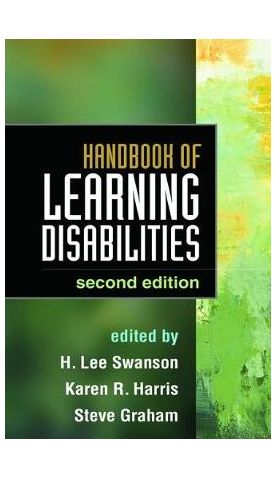אנו משתמשים ב-Cookies כדי לשפר את החוויה שלך. כדי לקיים ההנחיה החדשה של e-Privacy, עלינו לבקש את הסכמתך להגדיר את ה-Cookies. קבלת מידע נוסף.
257.00 ₪
Handbook of Learning Disabilities 2
257.00 ₪
ISBN13
9781462518685
יצא לאור ב
New York
מהדורה
2
עמודים
716
פורמט
Paperback / softback
תאריך יציאה לאור
23 באוק׳ 2014
Widely regarded as the standard reference in the field, this comprehensive handbook presents state-of-the-art knowledge about the nature and classification of learning disabilities (LD), their causes, and how individuals with these difficulties can be identified and helped to succeed. Best practices are described for supporting student performance in language arts, math, and other content areas. Contributors also identify general principles of effective instruction and review issues in service delivery within response-to-intervention (RTI) frameworks. The book critically examines the concepts and methods that guide LD research and highlights important directions for future investigation.
New to This Edition:
*Incorporates key advances in identifying and remediating LD, with particular attention to the role of RTI.
*Chapters on social cognitive, behavioral genetic, and neurobiological aspects.
*Chapters on adolescents and adults with LD.
*Chapters on spelling instruction, history instruction, and classroom technology applications.
*Chapter synthesizing 21st-century advances in LD research methods, plus chapters on advanced statistical models, single-case designs, and meta-analysis.
| מהדורה | 2 |
|---|---|
| עמודים | 716 |
| פורמט | Paperback / softback |
| ISBN10 | 1462518680 |
| יצא לאור ב | New York |
| תאריך יציאה לאור | 23 באוק׳ 2014 |
| תוכן עניינים | I. Foundations and Current Perspectives 1. Overview of Foundations, Causes, Instruction, and Methodology in the Field of Learning Disabilities, H. Lee Swanson, Karen R. Harris, and Steve Graham 2. A Brief History of the Field of Learning Disabilities, Daniel P. Hallahan, Paige C. Pullen, and Devery Ward 3. Classification and Definition of Learning Disabilities: A Hybrid Model, Jack M. Fletcher, Karla K. Stuebing, Robin D. Morris, and G. Reid Lyon 4. Learning Disabilities and the Law, Cynthia M. Herr and Barbara D. Bateman 5. Linguistically Diverse Students' Reading Difficulties: Implications for Models of Learning Disabilities Identification and Effective Instruction, Nonie K. Lesaux and Julie Russ Harris 6. Adults with Learning Disabilities: Factors Contributing to Persistence, Noel Gregg 7. From FAPE to FEPE: Toward an Excellent Public Education for Children and Youth with Learning Disabilities, Deborah L. Speece, Kimberly Palombo, and Jamey Burho 8. The State of the Science in Learning Disabilities: Research Impact on the Field from 2001 to 2011, G. Reid Lyon and Beverly Weiser II. Causes and Behavioral Manifestations 9. Attention-Deficit/Hyperactivity Disorder, Executive Function, and Reading Comprehension: Different but Related, Martha B. Denckla, Laura A. Barquero, Esther R. LindstrAm, Sabrina L. Benedict, Lindsay M. Wilson, and Laurie E. Cutting 10. Rapid Automatized Naming and Reading: A Review, George K. Georgiou and Rauno Parrila 11. Basic Cognitive Processes and Reading Disabilities, Linda S. Siegel and Silvia Mazabel 12. Memory Difficulties in Children and Adults with Learning Disabilities, H. Lee Swanson and Xinhua Zheng 13. Learning Disabilities in Mathematics: Recent Advances, David C. Geary 14. Language Processes: Characterization and Prevention of Language-Learning Disabilities, Mary Beth Schmitt, Laura M. Justice, and Jill M. Pentimonti 15. Social Cognition of Children and Adolescents with Learning Disabilities: Intrapersonal and Interpersonal Perspectives, Michal Al-Yagon and Malka Margalit 16. Behavioral Genetics, Learning Abilities, and Disabilities, Stephen A. Petrill 17. Diagnosing and Treating Specific Learning Disabilities in Reference to the Brain's Working Memory System, Virginia W. Berninger and H. Lee Swanson III. Domain-Specific Instruction/Intervention Research 18. Word Identification Difficulties in Children and Adolescents with Reading Disabilities: Intervention Research Findings, Maureen W. Lovett, Roderick W. Barron, and Jan C. Frijters 19. Developing a New Intervention to Teach Text Structure at the Elementary Level, Joanna P. Williams and Lisa S. Pao 20. Reading Comprehension for Adolescents with Significant Reading Problems, Sharon Vaughn, Elizabeth Swanson, and Michael Solis 21. Instructional Intervention for Students with Mathematics Learning Disabilities, Lynn S. Fuchs, Douglas Fuchs, Robin F. Schumacher, and Pamela M. Seethaler 22. The Writing of Students with Learning Disabilities, Meta-Analysis of SRSD Writing Intervention Studies, and Future Directions: Redux, Steve Graham, Karen R. Harris, and Debra McKeown 23. Classroom Spelling Interventions for Students with Learning Disabilities, T. F. McLaughlin, Kimberly P. Weber, and K. Mark Derby 24. Science and Social Studies, Thomas E. Scruggs and Margo A. Mastropieri 25. History Instruction for Students with Learning Disabilities, Cynthia M. Okolo and Ralph P. Ferretti IV. General Instructional Models 26. Direct Instruction as Eo nomine and Contronym: Why the Right Words and the Details Matter, Edward J. Kame'enui, Hank Fien, and Jaan Korgesaar 27. Cooperative Learning for Students with Learning Disabilities: Advice and Caution Derived from the Evidence, Rollanda E. O'Connor and Joseph R. Jenkins 28. Data-Based Individualization as a Means of Providing Intensive Instruction to Students with Serious Learning Disorders, Douglas Fuchs, Kristen L. McMaster, Lynn S. Fuchs, and Stephanie Al Otaiba 29. The Sociocultural Model as a Framework in Instructional Intervention Research, Carol Sue Englert and Troy Mariage 30. Technology Applications for Improving Literacy: A Review of Research, Charles A. MacArthur V. Measurement and Methodology 31. Design for Learning Disabilities Experimental and Quasi-Experimental Research, Victor L. Willson and William H. Rupley 32. Single-Case Design Intervention Research: Applications in the Learning Disabilities Field, Thomas R. Kratochwill, Margaret R. Altschaefl, Brittany J. Bice, and Jacqueline M. Kawa 33. Meta-Analysis of Research on Children with Learning Disabilities, H. Lee Swanson 34. Making a Hidden Disability Visible: What Has Been Learned from Neurobiological Studies of Dyslexia, Sally E. Shaywitz and Bennett A. Shaywitz 35. "Taking a Handful of World": Qualitative Research in Learning Disabilities, Brooke Moore, Janette Klingner, and Beth Harry |



Login and Registration Form